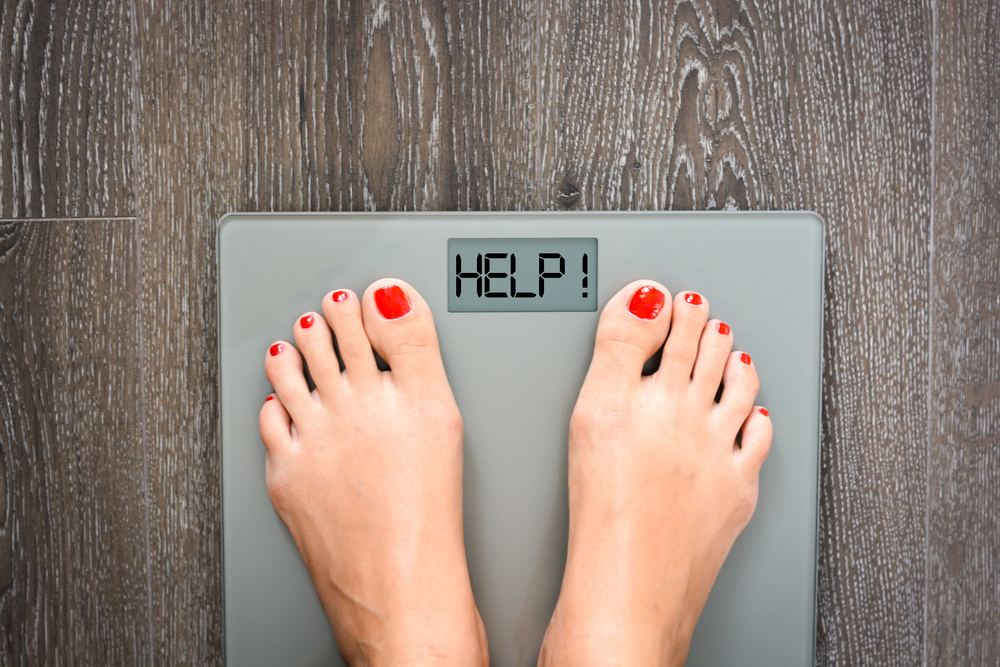How to Stop Menopause Weight Gain


By 2025, there will be more than 1 billion women in the world experiencing menopause. This equates to about 12% of the entire world population of 8 billion women. It is estimated that hot flashes and night sweats, common symptoms of menopause, will be experienced by approximately 75% of them. These, along with other conditions such as mood changes, anxiety, weight gain, and depression can lead to a significant reduction in a woman’s quality of life as she ages. (1)
Weight gain during menopause is a common complaint. Research shows that women gain about 1.5 pounds per year during their 50s and 60s which tends to settle in the abdominal region. These studies indicated that depletion of estrogen may be the cause. Over time, this can lead to obesity, one of the nation’s most significant health crises. (2)
Obesity is a major risk factor in both women and men for diabetes, cardiovascular disease, and hypertension. Obesity is also a major risk factor for urinary incontinence, dementia, some cancers, depression, and musculoskeletal disorders, especially osteoarthritis. (3)
As of 2020, the number of women over 51 who were overweight or obese stood at 23 percent. Obesity is substantially influenced by genetic, demographic, social, and behavioral factors. More specifically, this would include family history, emotional health, physical health, medications, work, diet, exercise, sleep habits, and stress. But since most women go through menopause, the cause of weight gain is difficult to prove and is often the result of more than one of these factors. (3)
What Causes Weight Gain During Menopause?
So, what really causes midlife weight gain? In addition to the hormonal changes that happen during menopause, other life changes can affect weight gain through and after menopause including:
- Retirement
- Increased travel
- Increased interest in leisure activities
- Increased time for social activities
- Change in life priorities
- Slower pace in life
These life changes can be accompanied by less activity and increased enjoyment of eating, things that often come with travel and social activities. Weight gain during menopause is not a given although some changes are expected due to the body’s natural aging process. As your age creeps up, estrogen and muscle mass decline. That slows your metabolism and changes the way your body stores and distributes fat, often leading to weight gain. (2)
How much of the weight gain is related to menopause and how much is related to other aging factors is not entirely clear. So, what else do you need to be aware of if you are starting to gain weight during menopause?
One study published in the American Journal of Epidemiology examined how different factors such as age, menopause, and lifestyle changes account for the weight gain often experienced in midlife by women. They studied the activity levels of over 3,000 women across the US and found that by remaining active, many prevented weight gain.
Previous studies observed that Japanese and Chinese women had lower fat intake than Caucasians and African Americans. Dietary fat has been positively related to estrogen levels in premenopausal and postmenopausal women. Lower fat and estrogen levels in Asian women might explain their negligible weight gain. (4)
A 5-year study done at the University of Ottawa in Canada investigated changes in body composition and cardiometabolic profile throughout the menopausal transition. They found that significant increases in total fat mass, percentage of fat mass, and visceral fat were seen in many women who were not overweight before menopause began.
Hunger During Menopause
Research is still not clear about how hormones, menopause, and appetite interact. Estrogen is known to keep your appetite under control. With the decrease in estrogen during menopause, this mechanism is no longer working properly so you feel hungry more often. If you continue to eat to satisfy your hunger, this can lead to weight gain.
It is important to maintain a healthy diet during menopause and after to keep from gaining too much weight. This means eating more protein, more fiber, more veggies, and more water. Exercise and sufficient sleep are also important. (5)
Effects Of Menopausal Weight Gain
The combination of menopause and aging can be significantly stressful and thus impact a woman’s physical competence, appearance, self-esteem, and social functioning. Apart from being at increased risk for a variety of chronic diseases, overweight women may also suffer from a decline in general well-being.
A review of eight studies examining HRQOL (health related quality of life) among women over 55 years old concluded that obese postmenopausal women have lower HRQOL in physical functioning, energy, and vitality compared with normal-weight women. Additionally, since mood disorders are one of the most important indicators of sexual dysfunction, weight gain and obesity at menopause may also affect sexual enjoyment.
How To Stop Menopausal Weight Gain
Reductions in weight and abdominal fat have been associated with a reduction in night sweats, heart palpitations, and changes in blood pressure in overweight and obese women. The combination of exercise and a healthy diet also affect psychological and physical health during this transition period. (4,6)
- Physical activity appropriate for your age and physical condition
- Healthy and well-balanced diet
- Regular sleep habits of eight hours a night
- Manage stress
If at all possible, avoid the use of diet suppressing medications, surgery such as bariatric, and hormone replacement therapies. These may cause unwanted side effects. Because it is a natural process, approaching the weight gain that may accompany menopause is best done through natural activities and practices. Consider holistic treatments such as yoga, acupuncture, and traditional Chinese and Ayurveda herbs and remedies. Also, look into the Mediterranean Diet as a good guide for eating healthy.
Consistent findings indicate that age, not menopause, is the main cause of weight gain at midlife, but that the hormonal changes during this time substantially contribute to increased central abdominal fat and abdominal obesity. Living a healthy and active life during menopause and beyond is the best behavior to keep your weight under control.
SOURCES
(2) https://www.verywellhealth.com/menopause-weight-gain-5184111
(3) https://www.tfah.org/report-details/state-of-obesity-2020/
(4) https://www.tandfonline.com/doi/full/10.3109/13697137.2012.707385
(5) https://gennev.com/education/menopause-and-hunger
(6) https://www.verywellhealth.com/how-to-prevent-weight-gain-during-menopause-3496389









